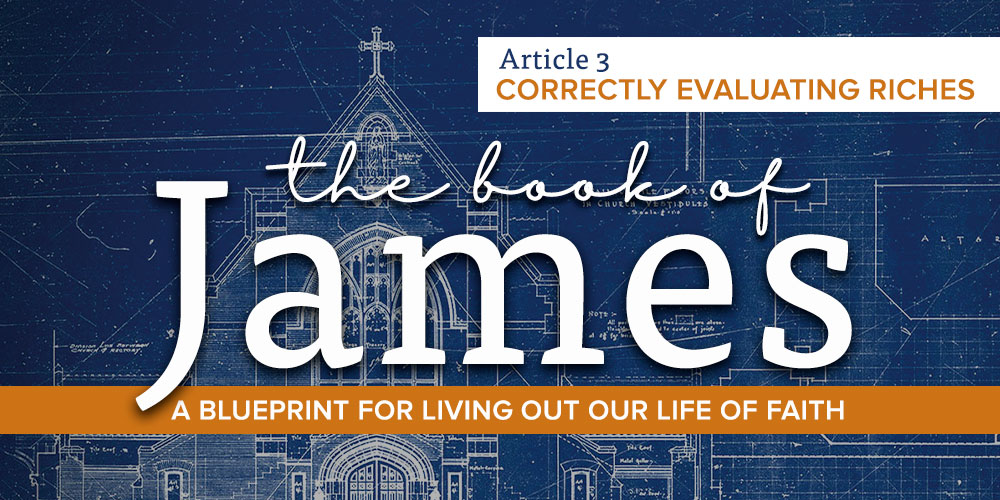 |
A blueprint for living out our life of faith
What are our chief concerns in life? Eternal salvation or earthly security? Christ’s righteousness or our own real estate? Peace or investments? Such questions come to mind as James in his blueprint for Christian living speaks about how faith evaluates riches.
Appraise them carefully
Nowhere does Scripture condemn the rich for being rich, but it does warn us of the temptations. Riches can quickly tempt people to make life an insatiable pursuit after possessions and can trick people to shift their trust from God to their wealth. The danger is always there that riches harden our attitudes about God, others, and the value of our possessions.
With vivid words, James warns those who put the wrong value on riches. If they would stop to think for a moment, all their smug satisfaction would evaporate and they would howl in hopeless anguish, for the riches will prove to be a rotting foundation in the coming judgment (James 5:1-3). People who look for no better treasure on earth will be wretched beggars in the day of judgment to come.
In our affluent society, we need James’ warning. We can never hear too often that God values a person not by what he has but by what he is in Christ. Our earthly treasures rot and rust. The angel of death rips them from our grasping fingers as we take our last breath. But the treasures God gives us in Christ abide forever.
Acquire them correctly
Putting the wrong value on riches can lead to wrong ways of acquiring them. Look at the ungodly in our verses. Their harvests were plentiful, but in their greed they cheated the poor workers who labored in their fields. Sadly, the poor cannot offer much resistance against such unjust treatment. On earth their appeals are seldom heard. In heaven, though, the Lord Almighty hears their cries (James 5:4). What he will do, James need not tell us.
James’ words speak to the age-old problem of how much labor should be paid and how much management should profit. They speak to the modern problems of soaring prices, business deals that consider only profit, and fair wages. They speak to you and me. Is wealth so important to us that we fail to see the needs of others? These are questions to ask lest we dismiss James’ words lightly.
Apply them conscientiously
Those who live for riches frequently use them only for themselves. The rich people in our verses lived much like cattle that feed well each day, totally unaware of the slaughter coming. What a vivid picture of people grown fat in mind and spirit, foolishly forgetting the coming judgment.
James wants us to examine carefully how we use what God has entrusted to our care. We dare not forget the physical needs of those around us. Hearts filled with God’s free riches in Christ lead to hands opened freely to others’ needs. Believers see another opportunity. Can there be any better use of God’s blessings than to devote generously to spreading the eternal riches found in Christ?
Digging deeper
1. Why is Proverbs 30:8,9 a good prayer for us when evaluating riches?
An abundance of earthly riches can lead to the feeling we don’t need God. The absence of earthly riches can lead to a lack of trust in the Lord. Therefore, it is a good prayer for Christians of all earthly conditions.
2. Why do we need the warning in 1 Timothy 6:9,10 more than ever when we are so prosperous?
The modern world suffers from “affluenza” with its feverish pursuit of earthly treasures. More than ever the “I” fever courses in their veins. Immersed in such a selfish stream, Christians are in danger of swallowing some of its pollution.
3. What do 1 Timothy 6:17,18 and Galatians 6:10 tell us about using the riches that God has given us?
Believers want to remember what heavenly treasures they have in God and his Word. They also want to show their faith in helping the less fortunate, first those in their own midst and then those in the world.
This is an article in a continuing series on the book of James.
Author: Richard Lauersdorf
Volume 108, Number 9
Issue: September 2021
- When politics drives you crazy: Part 4
- When politics drives you crazy: Part 3
- The book of James: Correctly evaluating riches
- When politics drives you crazy: Part 2
- When politics drives you crazy: Part 1





